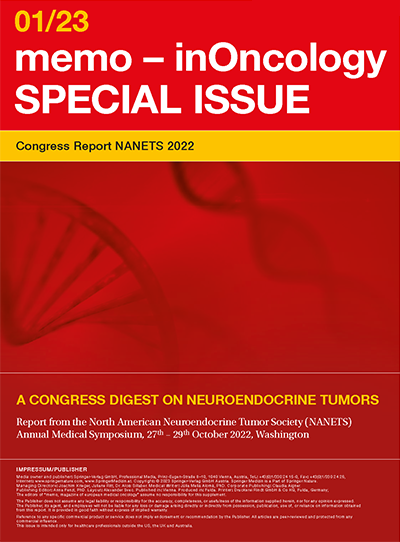NANETS 2022 – Washington
Lecture Board: Jaume Capdevila, MD; Mauro Cives, MD; Ebrahim S. Delpassand, MD; Daniel DePietro, MD
Medical Writer: Júlia Melià Alomà, PhD
Publishing Editor: Anna Fenzl, PhD
Preface – NANETS 2022
Preface – NANETS 2022 © private - Mauro Cives, MD, Department of Interdisciplinary Medicine, University of Bari "Aldo Moro", Bari, Italy Dear colleagues, Members of the professional neuroendocrine community gathered at the North American Neuroendocrine Tumor Society (NANETS) Symposium that took place in Washington, D.C., from 27th to 29th October 2022 to discuss new therapeutic options and the future of neuroendocrine tumor research. The scientific program, featuring 16 oral- and 91 poste
SSTR-positive neuroendocrine tumors: peptide receptor radionuclide therapy
SSTR-positive neuroendocrine tumors: peptide receptor radionuclide therapy Real-world insights into re-treatment with the FDA-approved β-emitter 177Lu-DOTATATE 177Lu-DOTATATE was approved by the FDA in 2018 following the encouraging results from the NETTER-1 trial, where a regimen of 4 doses was shown to improve both progression-free survival (PFS) and overall survival (OS) compared to somatostatin analog (SSA) therapy in patients with advanced gastroenteropancreatic neuroendocrine t
Advances in immunotherapy for neuroendocrine tumors
Advances in immunotherapy for neuroendocrine tumors Limited activity of checkpoint inhibitors as monotherapy Chemotherapy is currently the SoC first-line treatment for high-grade neuroendocrine neoplasms (HG-NENs), even though it only provides modest benefits in OS and PFS [1].
Biomarkers: predicting response to treatment
Biomarkers: predicting response to treatment Better PFS with CAPTEM in MEN1-mut/DAXX-wt pNET patients pNETs frequently contain mutations in MEN1, ATRX, DAXX, and the PI3K/AKT/mTOR pathway [1].





